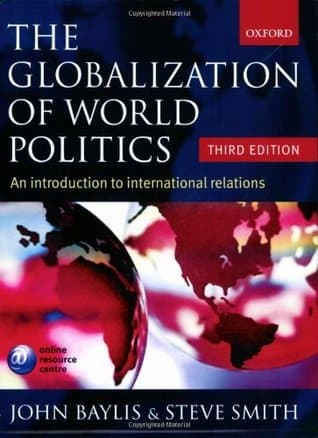
Book Review Summary: The Globalization of World Politics: An Introduction to International Relations
Introduction
In the rapidly evolving field of international relations, understanding the globalization of world politics is crucial for both students and scholars alike. "The Globalization of World Politics: An Introduction to International Relations" by John Baylis offers a comprehensive and engaging overview of the subject, making it a must-read for those seeking to gain a solid foundation in the field. With its third edition, the book has been updated to cover the latest developments and includes new chapters on international law, terrorism, and social constructivism.
About John Baylis
John Baylis, the author of "The Globalization of World Politics," is a renowned scholar in the field of international relations. He has contributed significantly to the understanding of international politics and has been instrumental in shaping the discourse on globalization. Baylis' expertise and insightful analysis make him a respected figure in the academic community, and his contributions to this book reflect his commitment to providing a comprehensive and accessible introduction to international relations.
Analysis of Views
- Comprehensive Coverage: The book offers a comprehensive overview of international relations, covering various topics such as world history, theoretical paradigms, actors in international politics, and global challenges. Readers appreciate the breadth of coverage provided by the book, which allows them to gain a holistic understanding of the subject.
- Accessible Writing Style: Baylis' writing style is praised for being engaging and accessible, making it suitable for both students and non-academic readers. The book's clear explanations and well-structured content make it easy to follow, even for those new to the subject.
- Depth vs. Breadth: While some readers appreciate the book's comprehensive coverage, others feel that it sacrifices depth in favor of breadth. They argue that certain chapters, such as those on world history from 1900-1990, lack the depth they expect from a textbook. However, many readers agree that the book remains a valuable starting point for understanding the basics of international relations.
- Theoretical Approaches: The book provides an in-depth exploration of various theoretical approaches in international relations, including realism, constructivism, and Marxism. Readers appreciate the balanced and well-researched analysis presented by Baylis, which helps them develop a deeper understanding of these theories.
- Case Studies and Additional Resources: The book includes case studies and additional resources that enhance its value as a learning tool. Readers appreciate the inclusion of real-world examples that help them apply their knowledge to practical situations. The companion website with up-to-date case studies further adds to the book's practicality and relevance.
Reasons for Recommendation
- Comprehensive Coverage: The book's comprehensive coverage of international relations makes it an ideal resource for students and scholars seeking a broad understanding of the subject. It covers a wide range of topics, from historical perspectives to contemporary issues, providing readers with a solid foundation in the field.
- Accessible Writing Style: Baylis' accessible writing style makes the book accessible to readers with varying levels of knowledge in international relations. His clear explanations and well-structured content make it easy to follow, even for those new to the subject.
- In-Depth Exploration of Theoretical Approaches: The book provides an in-depth exploration of various theoretical approaches in international relations, allowing readers to develop a deeper understanding of these theories. The balanced and well-researched analysis presented by Baylis adds value to the book as a learning tool.
Reasons for Not Recommendation
- Sacrificing Depth for Breadth: Some readers feel that the book sacrifices depth in favor of breadth, which may limit its usefulness for those seeking a more in-depth exploration of certain topics. While the book provides a broad overview, it may not satisfy readers looking for more detailed information on specific subjects.
- Limited Depth in Certain Chapters: A few readers express concerns about the depth of certain chapters, particularly those on world history from 1900-1990. They argue that these chapters lack the depth they expect from a textbook and may not provide sufficient information for more advanced research or writing assignments.
Conclusion
"The Globalization of World Politics: An Introduction to International Relations" by John Baylis offers a comprehensive and engaging overview of international relations, making it an essential resource for students and scholars alike. While some readers appreciate its breadth of coverage and accessible writing style, others feel that it sacrifices depth in favor of breadth. Nonetheless, the book's in-depth exploration of theoretical approaches and inclusion of case studies and additional resources make it a valuable starting point for understanding the complexities of global politics. Overall, "The Globalization of World Politics" is recommended as a foundational text for anyone seeking to gain a solid understanding of international relations in today's rapidly changing world.